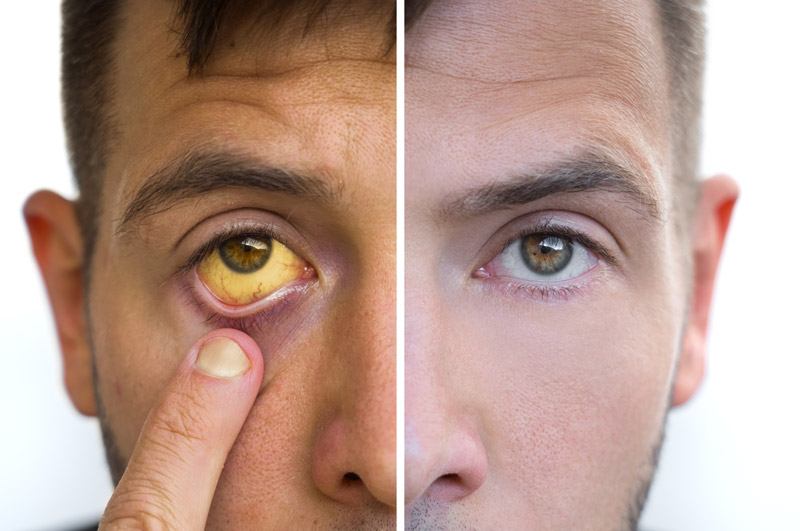Jaundice is a condition where your skin, the whites of your eyes and mucous membranes (like the inside of your nose and mouth) turn yellow. Many medical conditions can cause jaundice, like hepatitis, gallstones and tumors. Jaundice usually clears up once your healthcare provider treats your main medical condition.
Advertisement
Cleveland Clinic is a non-profit academic medical center. Advertising on our site helps support our mission. We do not endorse non-Cleveland Clinic products or services. Policy

Image content: This image is available to view online.
View image online (https://my.clevelandclinic.org/-/scassets/Images/org/health/articles/15367-adult-jaundice.jpg)
Jaundice (hyperbilirubinemia) is when your skin, sclera (whites of your eyes) and mucous membranes turn yellow. Jaundice occurs when your liver is unable to process bilirubin (a yellow substance made when red blood cells break down) in your blood. This can either be caused by too much red blood cell breakdown or liver injury.
Advertisement
Cleveland Clinic is a non-profit academic medical center. Advertising on our site helps support our mission. We do not endorse non-Cleveland Clinic products or services. Policy
How jaundice develops:
Jaundice can result from a problem in any of the three phases of bilirubin:
Advertisement
Conditions that cause jaundice include:
You may not notice the yellow skin and sclera associated with jaundice. Your provider may find the condition when looking for something else. How serious your symptoms are depends on what causes them and how quickly or slowly they develop.
Symptoms that can be associated with jaundice include:
Your provider can tell if you have jaundice by measuring the bilirubin levels in your blood and seeing whether it’s the type of bilirubin related to red blood cell breakdown (unconjugated) or liver injury (conjugated). They may also check for other signs of liver disease, including:
Your healthcare provider will also examine you to decide your liver’s size and tenderness. They may use imaging (ultrasound and CT scanning) and liver biopsy (taking a tissue sample of your liver) to better understand what’s causing your liver injury.
There’s no specific treatment for jaundice. But your provider can treat the cause and the jaundice should improve. They can also treat complications the condition causes. For example, if itchy skin is a problem, your provider can prescribe medication.
It depends on what’s causing your jaundice. If it’s a virus, the virus could spread or become chronic. But if you have jaundice because your liver is failing, complications from your liver disease can include coma and death.
Since there are many causes of jaundice, it’s hard to find ways to prevent it. Some general tips include:
Advertisement
A healthcare provider should evaluate jaundice. It’s a sign that something’s not right with your liver. If you notice signs of jaundice, call your healthcare provider.
Jaundice is common in newborn babies. Like with adults, a buildup of bilirubin in your baby’s blood can cause jaundice. Since your baby’s liver is still developing, it can’t remove (or break down) all the bilirubin. Jaundice usually goes away on its own or providers treat it with phototherapy.
It might be scary to see your skin and the whites of your eyes turning yellow. Or it might happen so gradually that you don’t notice until people around you point it out. It’s normal to worry but try not to worry too much. Keep in mind that jaundice is a sign of another health problem. That means your healthcare provider must treat your main illness before it clears up.
Be sure to tell your provider what prescribed medications you’re taking. They may have to adjust the dosage or prescribe a substitute.
It’s also a good idea to ask your family and friends for support. They can handle daily chores to let you focus on getting well. Be sure to rest, eat balanced meals and drink plenty of fluids. Also, avoid any substance that strains your liver, like alcohol, herbal supplements or over-the-counter pain relievers.
Advertisement
If you don’t feel better by the time your provider gave you, make an appointment to see them again right away.
Advertisement

Sign up for our Health Essentials emails for expert guidance on nutrition, fitness, sleep, skin care and more.
Learn more about the Health Library and our editorial process.
Cleveland Clinic’s health articles are based on evidence-backed information and review by medical professionals to ensure accuracy, reliability and up-to-date clinical standards.
Cleveland Clinic’s health articles are based on evidence-backed information and review by medical professionals to ensure accuracy, reliability and up-to-date clinical standards.
If you have a disease that’s affecting your liver, you want expert advice and care. At Cleveland Clinic, we’ll create a treatment plan that’s right for you.
